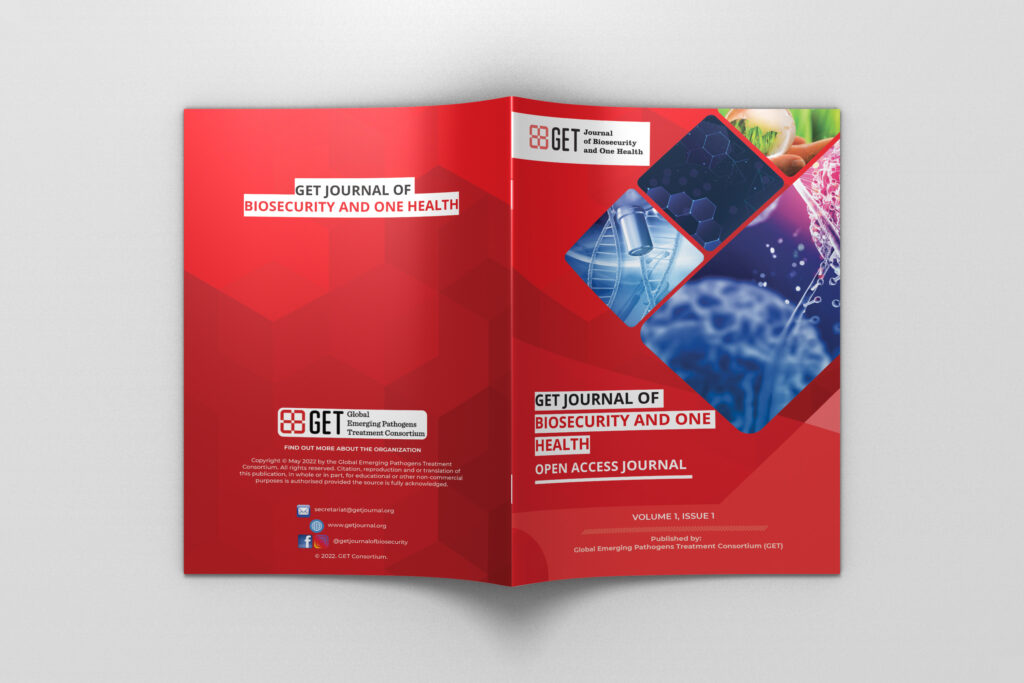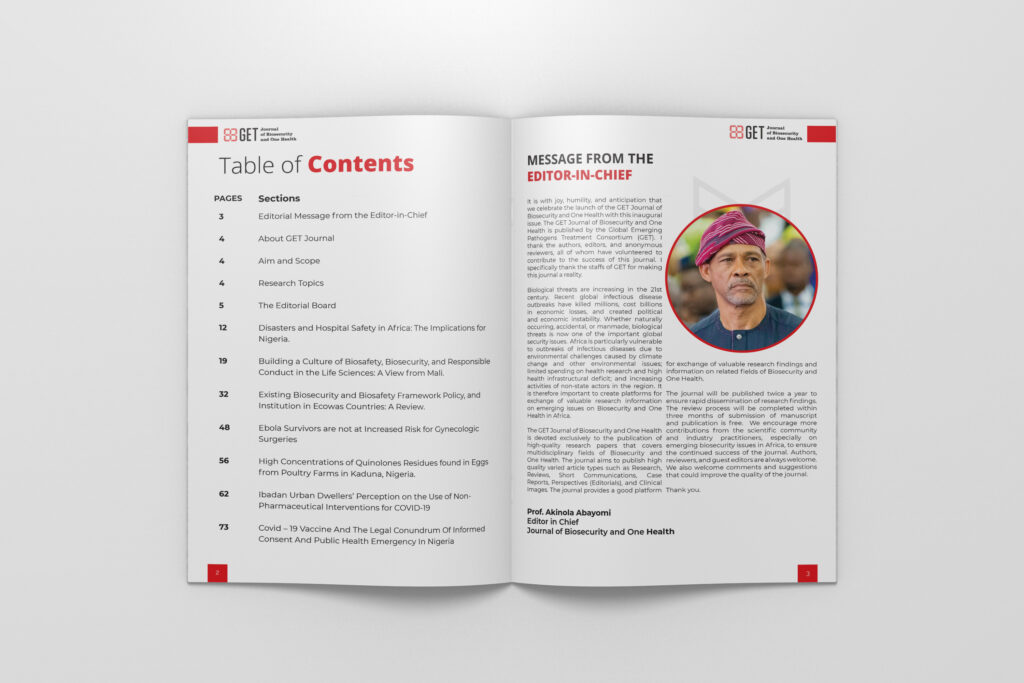GET Journal of Biosecurity and One Health
Volume 1 Issue 1
Authors: Joshua *IA1;Stanley AM2;Igboanusi CJC 3;Oguntunde RO 4;Muhammad-Idris ZK 1;Audu O5
GET Journal of Biosecurity and One Health, Volume 1, Issue 1, June 2022, Pages 1-6
Article Keywords: Africa, Disasters, Hospital safety, Nigeria.
Nigeria has suffered from both natural and man-made disasters such as flooding, drought; civil unrest, genocide and insurgency; and the country is very important in the continent in terms of its population size, weak health systems and poor disaster preparedness. During disasters, hospitals play critical role by providing essential medical care to the injured in the communities. This paper assessed the relationship
between disasters and hospital safety in Nigeria. The study is a narrative review using secondary literature from PubMed, Medline and Google scholar databases. The search words were disaster, Africa, Nigeria and hospital safety. Hospital safety index (HSI) is a global diagnostic tool that provides a snapshot of the probability of functionality of a hospital during disasters. It has structural, non-structural and functional factors in addition to environment and the health services network dimensions with 145 items that can be assessed and grouped into three safety categories- high (A), average (B) and low (C).
Category A with score of 0.00-1.0, requires preventive measures to maintain and improve safety; category B with score of 0.36-0.65 measures are required in the short time to reduce losses; category C with score of ≤0.35 requires urgent measures to protect lives. Nigeria over the years has experienced flooding, epidemic, insurgency, fire outbreaks and gas explosion among others with serious impacts. The flood of 2012 alone caused 363 deaths, 2.1 million displaced persons, 18,282 injured and damages of
$16.9 billion. The challenges include large gap between policy and implementation, poor knowledge and education on HSI, lack of hazards vulnerability and capacity assessment, hospital building code issues, corruption and poor post-disaster analyses. It is a wakeup call for synergistic action by the relevant stakeholders to reduce risk, protect health facilities and save lives in Africa in general and Nigeria in particular.
Authors: Dao K1; Tarangelo JP2; Epting M3; Keita A1;Mariko K1;Danskin K3; Iknane A1; and Perkins D3*
GET Journal of Biosecurity and One Health, Volume 1, Issue 1, June 2022, Pages 7-19
Article Keywords: Biosafety, biosecurity, Mali, responsible conduct, organizational culture.
Adherence to biosafety and biosecurity standards and practices by those involved in the life sciences is essential to protecting the health of humans, animals, and the environment. Fostering a culture of responsibility is one of the underlying tenets of the Biological Weapons Convention, the Global Health Security Agenda, Joint External Evaluation of International Health Regulations, and the Global Partnership Against the Spread of Weapons and Materials of Mass Destruction. It also underpins national and international efforts to protect science from misuse and to protect workers and the public from laboratory incidents. Unlike the nuclear domain, there is no available guidance or unified perspective on the nature of this culture or how it may be assessed. The International Working Group on Strengthening the Culture of Biosafety, Biosecurity, and Responsible Conduct in the Life Sciences developed a framework to assess organizational culture in biological laboratories based on the model developed by the International Atomic Energy Agency for nuclear facilities. This framework encompasses 1) management systems; 2) behavior of leadership and personnel; 3) principles for guiding decisions and behaviors; and 4) beliefs, opinions and attitudes. Here we present an example of how the beliefs, opinions, and attitudes element was employed to assess the organizational culture of laboratorians from five regions in Mali. This is the first assessment using the framework and, as such, provides a model for others seeking to improve biosafety and biosecurity, and may ultimately lead to international harmonization of this concept and provide a pathway to strengthen Mali’s laboratory system.
Authors: Abayomi I1,2, Abdourahmane S3, Bobadoye A2,4* OlivierM3, Issiaka S3,Alabi I2, Stanley O3, Bobadoye B4
GET Journal of Biosecurity and One Health, Volume 1, Issue 1, June 2022, Pages 20-33
Article Keywords: : Biosecurity, Biosafety, ECOWAS, Laboratories, Policies and Frameworks, WAHO.
This study reviews the current biosecurity and biosafety policies and institutional landscapes in West Africa. Given the increase in biosecurity threats, especially increase in frequency and intensity of emerging and re-emerging infectious diseases in West Africa, it is important to analyse the current policies and institutional landscape and their ability to ensure a biosecured region. Advances in science, technology, and biotechnology, which has improved global practices, bettered our understanding of daily activities, exposed the world to a vast body of knowledge, has at the same time enhanced the frequency of outbreak of biological threats. The capacity of various nations to prevent, detect and respond to emerging infectious diseases has been undermined due to numerous challenges unique to each country, hence the need to study the existence and the extent of biosecurity and biosafety policies, framework, and institutions in ECOWAS states/countries. Data were collected using semi-structured questionnaire, key informant interview and desk study. This study revealed that several legislative instruments and policy responses had been enacted to address biosecurity and biosafety challenges in West African countries; however, the translation of these policies and legislative instruments in documents to practices remains a hurdle owing to multiple challenges including the lack of human capacity to implement policies and lack of specialized institutions that will implement the policies which would not be able to control mishandling and misuse of infectious agents and toxins, disregard for government policy due to absence of oversight of life sciences research of concern, insider and outsider threats at laboratories dealing with biological agents, and poor physical security and materials accountability including transfer and transport of infectious agents and toxins. Conclusively, to promote a safe and secure environment, emphasis must be placed on developing a curriculum for biosafety and biosecurity education that focuses on developing skills to maintain responsible health security practices and human resource incentives to drive a culture of safe and secure science. There is also the need for a clear synchronized framework that governs laboratory and biobanking activities in the West African region.
Authors: Gorpudolo-Dennis N1; Kennedy SB2*; Reilly C3 and Sankoh M
GET Journal of Biosecurity and One Health, Volume 1, Issue 1, June 2022, Pages 34-40
Article Keywords: Ebola Virus Disease (EVD); Emerging Infectious Diseases (EIDs); Ebola Survivors; Uterine
Surgery; Females; Liberia.
Adherence to biosafety and biosecurity standards and practices by those involved in the life sciences is essential to protecting the health of humans, animals, and the environment. Fostering a culture of responsibility is one of the underlying tenets of the Biological Weapons Convention, the Global Health Security Agenda, Joint External Evaluation of International Health Regulations, and the Global Partnership Against the Spread of Weapons and Materials of Mass Destruction. It also underpins national and international efforts to protect science from misuse and to protect workers and the public from laboratory incidents. Unlike the nuclear domain, there is no available guidance or unified perspective on the nature of this culture or how it may be assessed. The International Working Group on Strengthening the Culture of Biosafety, Biosecurity, and Responsible Conduct in the Life Sciences developed a framework to assess organizational culture in biological laboratories based on the model developed by the International Atomic Energy Agency for nuclear facilities. This framework encompasses 1) management systems; 2) behavior of leadership and personnel; 3) principles for guiding decisions and behaviors; and 4) beliefs, opinions and attitudes. Here we present an example of how the beliefs, opinions, and attitudes element was employed to assess the organizational culture of laboratorians from five regions in Mali. This is the first assessment using the framework and, as such, provides a model for others seeking to improve biosafety and biosecurity, and may ultimately lead to international harmonization of this concept and provide a pathway to strengthen Mali’s laboratory system.
Authors: Abdulkadir A; Likeh DA and Mustapha BM.
GET Journal of Biosecurity and One Health, Volume 1, Issue 1, June 2022, Pages 41-46.
Article Keywords: Quinolones; Residues; Drug Resistance; Poultry Egg, Safety; One Health.
Eggs are the major product generated from layer poultry production systems and are readily processed for consumption and sold to meet public demand. However, antimicrobial usage during production results in residues accumulating in poultry eggs. Thus, it is necessary to monitor and ensure that poultry eggs are safe for human consumption, with no antibiotic residues that can lead to allergic reactions/intoxication or development of antimicrobial resistance. Forty-five (45) farms around Kaduna metropolis, Nigeria were sampled for table eggs alongside a structured questionnaire to consider operation systems (cage or floor), stocking system (all-in-all-out or multiple batches), and location, along with egg producer sizes as either small-, medium-, or large-scale producers. A total of 450 fresh eggs were collated and analyzed using Enzyme-Linked Immunosorbent Assay. The result overall, showed a high prevalence (95.6%) of samples positive for quinolone residues with highest levels of 10,185.5 ng/ml and 5,519ng/ml from two farms (4.4%). These levels are higher than the Maximum Residue Limits (MRL) for edible tissue set by regulatory agencies, including the European Union and U.S. Department of Agriculture (100 ng/ml=100 mg/l). Thirty-three (33) samples from 33 farms (73.3%) overall had residue levels higher than the MRL, 10 farms (22.2%) had residue levels ranging between 2.5 ng/ml – 94.5 ng/ml, while only two farms had undetectable limits of less than 2.5ng/ml. No specific association was found for any of the assessed production factors. Quinolones are antibiotics used both in veterinary and human medicine, thus, their usage must comply with set safety criteria. Consequently, the presence of quinolones in poultry eggs may result in the transmission, to humans, of resistant bacteria and residues of fluoroquinolone active metabolites harmful to human health.
Authors: Oyamakin OS and Adegbayibi AI.
GET Journal of Biosecurity and One Health, Volume 1, Issue 1, June 2022, Pages 47-56.
Article Keywords: SARS-CoV-2; Ibadan; Risk perception; SARS coronavirus; COVID-19; Binary Logistic Regression.
SARS coronavirus cases have been reported all across the world in the previous two years. The rate of transmission has been steadily increasing over time. This study examines residents’ knowledge, attitudes, and preventive activities for SARS-CoV-2 prevention in five local government areas in Ibadan’s urban zone (total population: 1,886,800 inhabitants, census 2016).During the months of November and December, 2021, a cross-sectional survey based on the health belief model was conducted with a simple random sample of 355 respondents from densely populated regions of urban Ibadan. SARS-CoV-2 was known by a total of 262 people. Only 33.5% of the total respondents were concerned about SARS coronavirus. A small percentage (4.5%) had previously been diagnosed with SARS coronavirus, 66.7% considered a SARS-CoV-2 infection to be serious, yet only 33.5% were concerned about SARS coronavirus. The results are inconsistent in reporting preventive practices, either community-level interventions (e.g., quarantining/self-isolating after returning from travel, 23.9%; actively maintaining a certain distance between myself and people outside, 31.8%) or personal preventive behaviours (e.g., use of alcohol-based hand sanitizers, 53.2%). Participants who reported willingness to accept a SARS-CoV-2 vaccine were more likely to perceive the risk of contracting it as higher (aOR = 1.02, 95% confidence interval [CI] = 1.01–1.04), as well as knowing if a friend had previously been diagnosed with SARS coronavirus (aOR = 2.92, 95% confidence interval [CI] = 1.62–5.55), according to a multivariate analysis using stepwise binary logistic regression which had a 77.27% predictive accuracy, using a test-train, confusion matrix split. In conclusion, the findings of this study suggest that future interventions promoting SARS-CoV-2 prevention among inhabitants of urban Ibadan should focus on individuals’ views of SARS coronavirus vulnerability, highlighting the benefits of personal protective behaviors.
Authors: Adeleke LA.
GET Journal of Biosecurity and One Health, Volume 1, Issue 1, June 2022, Pages 57-67.
Article Keywords: Covid-19; Vaccine; Informed-consent.
As the COVID-19 continues to ravage human population since December 2019, medical professionals and people from other turfs of human knowledge have remained awake, with a view to nipping the spread of the virus in the bud. As early as 30th January 2020, WHO declared the virus a Public Health Emergency of International Concern (PHEIC) and an epidemic, with relentless efforts to arrest its spread. Yet, the virus nibbled away a large fortune in the global economy. While the virus becomes hydra-headed with its variants, vaccines have been developed to curtail its morbidity and mortality. Vaccinations are acknowledged as one of the most important and successful public health interventions. Nonetheless, there are legal hurdles to be crossed as vaccines are deployed to fight COVID-19 across the globe. Consent and fundamental rights of the individuals to be vaccinated sometimes conflict with the public health emergency needs, resulting in mandatory vaccination of every member of a given population. The two sides of the divide have their respective legal backings as inherent in the two locus classicus of Jacobson v. Massachusetts and Schloendorff v. Society of New York Hospital. The former established the principle of mandatory vaccination on account of public health emergency, while the principle of informed consent and self-determination have their roots in the latter. Subsequent cases, including Nigerian decisions in recent years have upheld the principle of informed consent and self-determination in medical treatment. The main thrust of this paper is to examine the effect of corona virus vaccination and COVID-19 status certificate on self-determination and human rights in Nigeria. The paper concludes that with deep rooted trust and transparency, suspicion and mistrust, which are the bedrock of the anti-vaccination movement will fizzle out and the legal conundrum ease off.



Volume 1 Issue 2 Journals
- Attitude Towards Covid-19 Vaccines and Willingness to be Vaccinated Among Orientation Camp Dwellers in IkareAkoko, Ondo State, Nigeria
- Design and Implementation of Nasopharyngeal Specimen Storage in Straws during the COVID19 Pandemic in Côte d’Ivoire
- Integration of Quality Management Systems in a Rural, Low-Resource Environment: The Experience at Phebe Hospital in Bong County, Liberia
- Molecular Detection of Measles Virus from Febrile Rash Illness Cases in Lagos State, Nigeria.
- Prevalence of Health Workforce Burnout during COVID-19 Response in Ethiopia.
- Volume 1 Issue 1



